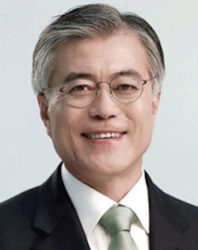SEOUL, (Reuters) – South Korea’s new liberal President Moon Jae-in was sworn in yesterday and vowed to tackle immediately the difficult tasks of addressing North Korea’s advancing nuclear ambitions and soothing tensions with the United States and China.

Moon said in his first speech as president he would begin efforts to defuse security tensions on the Korean peninsula and negotiate with Washington and Beijing to ease a row over a U.S. missile defence system being deployed in the South.
In a congratulatory phone call U.S. President Donald Trump agreed with Moon to cooperate on the North Korean nuclear issue and invited him to visit Washington, the South Korean presidential office said.
The White House said the two agreed to continue to strengthen the alliance between their countries.
The South Korean statement said Trump said North Korea’s nuclear problem was difficult, but one that could be resolved.
North Korea is believed to be preparing for a sixth nuclear test and is working to develop a nuclear-tipped missile capable of reaching the United States, presenting Trump with perhaps his most pressing security issue.
U.S. officials have expressed concern that Moon’s advocacy of engagement with North Korea could undercut U.S. efforts to increase pressure through further isolation and sanctions.
The Trump administration has also been dismayed by Moon’s questioning of deployment of a U.S. missile defence system in South Korea and expects some friction in ties, although U.S. officials say the new president may moderate his stances in office and the effect on the alliance will be limited.
In his first key appointments, Moon named two liberal veterans with ties to the 2000s “Sunshine Policy” of engagement with North Korea to the posts of prime minister and spy chief.
Suh Hoon, a career spy agency official who was instrumental in setting up two previous summits between the North and South, was named to head the National Intelligence Service.
Lee Nak-yon, a regional governor who was a political ally of two former presidents who held summits with North Korea in 2000 and 2007 was nominated as prime minister. His appointment requires parliamentary approval.
Moon was expected to fill the remaining cabinet and presidential staff appointments swiftly to bring an end to a power vacuum left by the removal of Park Geun-hye in March in a corruption scandal that rocked South Korea’s business and political elite.
“I will urgently try to solve the security crisis,” Moon said in the domed rotunda hall of the parliament building. “If needed, I will fly straight to Washington. I will go to Beijing and Tokyo and, if the conditions are right, to Pyongyang also.”
Suh said Moon could go to Pyongyang if it was clear the visit would help resolve the North Korean nuclear crisis and ease tensions.
North Korea is likely to welcome Moon’s election but its state media made no mention of his victory on Wednesday.
The U.S. Central Intelli-gence Agency (CIA), meanwhile, chose the day after Moon’s election to announce it had established a Korea Mission Center “to harness the full resources, capabilities, and authorities of the Agency in addressing the nuclear and ballistic missile threat posed by North Korea.”
It said the center would gather experienced officers from across the CIA in one entity “to bring their expertise and creativity to bear against the North Korea target.”
Moon met leaders of opposition parties before his simple swearing-in ceremony at parliament, where his party lacks a majority, and promised to coordinate with them on national security.
In his speech, Moon, 64, also pledged to sever what he described as the collusive ties between business and government that have plagued many of South Korea’s family-run conglomerates, known as chaebol, and vowed to be incorruptible.
“I take this office empty-handed, and I will leave the office empty-handed,” Moon said.
